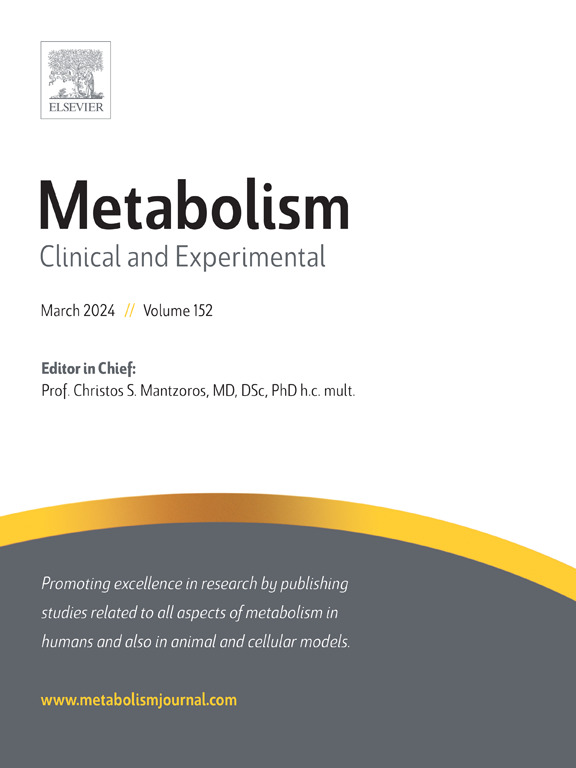Targeting RBP4–STRA6 retinol signaling disrupts adipose–prostate crosstalk: A novel strategy to suppress basal cell plasticity in androgen deprivation
IF 11.9
1区 医学
Q1 ENDOCRINOLOGY & METABOLISM
引用次数: 0
Abstract
Metabolic rewiring is a starter for lineage plasticity, which is an important driver of prostate development, tumorigenesis and treatment resistance. Androgen-targeted therapies are central to prostate cancer (PCa) management, yet the mechanisms leading prostate development—particularly the metabolic signaling within basal cells during treatment—remain poorly understood. To fulfill this gap, we used multiple models to reveal the metabolic alterations in prostate basal cells. Our study reveals the role of the RBP4-STRA6 axis in modulating retinol metabolism and transporting retinol from adipocyte into prostate cells, contributing to prostate development and basal cell differentiation during androgen deprivation. Through multi-omics analyses, we demonstrate that RBP4-STRA6 axis dependent retinol metabolism is increased with androgen deprivation. Retinol metabolism rewiring is modulated by the androgen receptor (AR) and can regulate basal cell plasticity under androgen deprivation therapy (ADT). Retinol metabolism maintains prostate basal cell lineage plasticity during hormone therapy through the PPARγ signaling pathway, compensating for the AR signaling pathway inhibition by sustaining energy homeostasis and promoting basal cell differentiation. Notably, we identified a basal cell cluster (BC5) characterized by high Retinol metabolism and activated PPARγ signaling pathway, which plays a crucial role in basal-luminal differentiation and prostate growth. This study underscores the importance of RBP4-STRA6 dependent Retinol metabolism, mediating the crosstalk between adipocytes and prostate basal cells, in maintaining prostate development during hormone therapy and provides a foundation for future clinical interventions and diet strategies aimed at enhancing the sensitivity of androgen deprivation in prostate diseases.
靶向RBP4-STRA6视黄醇信号干扰脂肪-前列腺串扰:雄激素剥夺中抑制基底细胞可塑性的新策略
代谢重布线是谱系可塑性的启动器,谱系可塑性是前列腺发育、肿瘤发生和治疗抵抗的重要驱动因素。雄激素靶向治疗是前列腺癌(PCa)治疗的核心,然而导致前列腺发展的机制,特别是治疗过程中基底细胞内的代谢信号,仍然知之甚少。为了填补这一空白,我们使用了多种模型来揭示前列腺基底细胞的代谢改变。我们的研究揭示了RBP4-STRA6轴在调节视黄醇代谢和将视黄醇从脂肪细胞转运到前列腺细胞中的作用,在雄激素剥夺过程中促进前列腺发育和基底细胞分化。通过多组学分析,我们发现RBP4-STRA6轴依赖性视黄醇代谢随着雄激素剥夺而增加。在雄激素剥夺疗法(ADT)下,视黄醇代谢的重新连接是由雄激素受体(AR)调节的,可以调节基底细胞的可塑性。在激素治疗过程中,视黄醇代谢通过PPARγ信号通路维持前列腺基底细胞谱系的可塑性,通过维持能量稳态和促进基底细胞分化来补偿AR信号通路的抑制。值得注意的是,我们发现了一个基底细胞簇(BC5),其特征是高视黄醇代谢和激活的PPARγ信号通路,在基底腔分化和前列腺生长中起着至关重要的作用。该研究强调了RBP4-STRA6依赖性视黄醇代谢,介导脂肪细胞和前列腺基底细胞之间的串扰,在激素治疗期间维持前列腺发育的重要性,并为未来的临床干预和饮食策略提供了基础,旨在提高雄激素剥夺在前列腺疾病中的敏感性。
本文章由计算机程序翻译,如有差异,请以英文原文为准。
求助全文
约1分钟内获得全文
求助全文
来源期刊

Metabolism: clinical and experimental
医学-内分泌学与代谢
CiteScore
18.90
自引率
3.10%
发文量
310
审稿时长
16 days
期刊介绍:
Metabolism upholds research excellence by disseminating high-quality original research, reviews, editorials, and commentaries covering all facets of human metabolism.
Consideration for publication in Metabolism extends to studies in humans, animal, and cellular models, with a particular emphasis on work demonstrating strong translational potential.
The journal addresses a range of topics, including:
- Energy Expenditure and Obesity
- Metabolic Syndrome, Prediabetes, and Diabetes
- Nutrition, Exercise, and the Environment
- Genetics and Genomics, Proteomics, and Metabolomics
- Carbohydrate, Lipid, and Protein Metabolism
- Endocrinology and Hypertension
- Mineral and Bone Metabolism
- Cardiovascular Diseases and Malignancies
- Inflammation in metabolism and immunometabolism
 求助内容:
求助内容: 应助结果提醒方式:
应助结果提醒方式:


